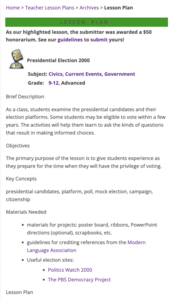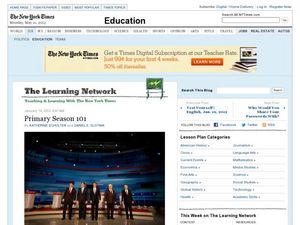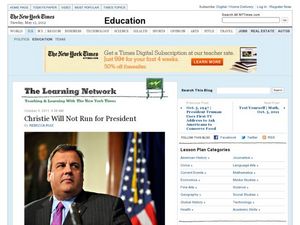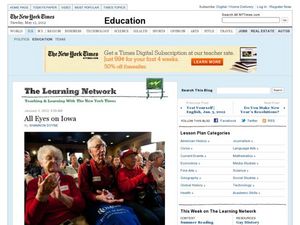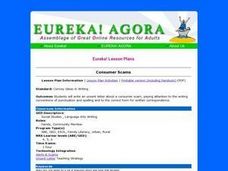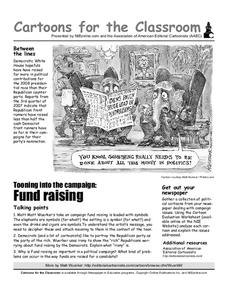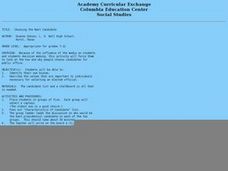Museum of the Moving Image
Playing on Emotions: Focus on Political Ads Featuring Children
Political ads are designed to play on viewers' emotions. The focus of this resource is on ads that feature children, either to establish the candidate as family friendly, or to create fear for children in the minds of viewers. Groups...
Museum of the Moving Image
Understanding the Language of Political Ads
The verbal techniques and emotional appeals contained in the language used in political ads plays a vital role in creating the impact of the ad. As class members continue their study of Presidential campaign commercials from 1952–2012,...
Museum of the Moving Image
Political Ads in Historical Context
Campaign ads target both timely issues and general themes. Presidential campaign ads from 1952 and 1988 provide class members an opportunity to compare how the topics ads choose to address can dramatically influence election outcomes.
Museum of the Moving Image
Developing Critical Analysis
To gain an understanding of how images and sounds are used to influence viewers, class members analyze these features in Presidential campaign commercials from 1952-2012.
Museum of the Moving Image
Evaluating Information: Focus on the 2008 Election
Just how true is the information contained in political ads? Determining the veracity of campaign ads from the 2008 presidential race is the focus of a lesson that introduces class members to several fact-checking resources.
Curated OER
Political Campaign Ads
During a political campaign, you can hardly turn around without encountering an endorsement or attack on a candidate. High schoolers examine the ways that negative advertisement, positive advertisements, and everything in between can...
Classroom Law Project
What are some of today’s voting issues? Voting in Oregon, youth vote, and technology
The youth vote. Rock the Vote. Vote-By-Mail. Electronic voting. Class members investigate issues facing today's voters, and the ways they have adapted over the years to optimize voter turnout.
Classroom Law Project
What is a class hearing and youth summit and what do they have to do with the presidential election?
After researching the presidential election process, class members develop questions and interview voters about their choice of candidate and the issues that concern them.
Classroom Law Project
What should I watch for in the debates?
Prepare your classes for election year debates with a series of activities that model how to watch televised debates and how to evaluate the moderators as well as the debaters.
Classroom Law Project
Who are the major candidates and where do they stand?
Who were the candidates in the 2008 US Presidential election and where did they stand on important issues? Use a resource that offers an opportunity to go back in time and examine candidates and issues involved in that election year.
PBS
What Are the Primaries and Caucuses?
What are the essential differences between primaries and caucuses? As part of a study of the process by which Americans select their candidates for US president, class members examine the nominating process, the changes that have...
Curated OER
The Presidential Campaign Game
High schoolers play a game. For this election lesson, students play the Presidential Campaign Game. High schoolers learn about the politics and process of electing a president.
Curated OER
Presidential Election 2000
Students examine the presidential candidates and their election platforms. They further analyze the platforms by creating a chart to determine which candidate most represents his or her beliefs and values.
Curated OER
Do Presidential Candidates Need to Be Good Debaters?
Blogs can be a good way for learners to engage in writing, critical thinking, and social media in a formal way. The New York Times has provided learners age 13-18 with an article, background information, and several prompts to get them...
Curated OER
What if Your Parent Ran for President?
Throughout history, many people have run for president. But, what is that like for the children of those individuals? Kids read a bit about Mitt Romney and his five children, then respond to a writing prompt in a blog post. They describe...
Curated OER
Primary Season 101
While this New York Times resource posted several months ago it could still be a useful learning experience. Learners practice using the Times's Campaign 2012 Politics section to help them answer 16 questions about the Republican...
Curated OER
Christie Will Not Run for President
Readers answer eight who, what, when, why, and where questions as they read this New York Times article. They peruse the article to learn about Chris Christie and the 2012 presidential race. Next, they answer the related comprehension...
Curated OER
All Eyes on Iowa
Guid your learners as they become informed members of our community. They'll consider each of the seven questions as they read the New York Times article "All Eye on Iowa." This article relates topics dealing with the 2012 presidential...
Curated OER
Cartoons for the Classroom: Campaign Echoes
Get on those thinking caps, because your class is going to analyze a political cartoon related to the 2008 presidential elections. Included is a large image of the cartoon, background information, and three guiding questions which can be...
Curated OER
Convey Ideas in Writing
Use the platforms of the 2004 presidential candidates to bring persuasive writing to your class. Young voters identify the three issues most important to them in the election and research the issues and candidates' positions. They write...
Curated OER
Cartoons for the Classroom: Presidential Candidates
Build critical analysis skills with this cartoon for the classroom. Upper graders answer three critical thinking questions to help them analyze a political cartoon, which depicts how Presidential Candidates are judged and chosen. Put...
Curated OER
The Presidential Campaign Game
Upper graders play a game as a way to facilitate understanding of US Presidential Campaign issues and strategies. After being divided into small groups, a candidate will be chosen to run for office. Each group creates propaganda to get...
Curated OER
Cartoons for the Classroom: Campaign Fundraising
Although this political cartoon analysis assignment has your scholars glancing back at the 2008 presidential campaign, its message is relatable anytime. Background information provides context, giving learners access to the cartoon,...
Curated OER
Choosing the Best Candidate
Who would win an election between Napoleon and Julius Caesar? Group your class up to analyze and discuss which of their given choices would make the best presidential candidate, given specific criteria. The potential candidate list...














